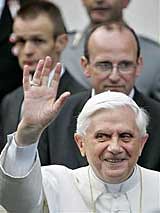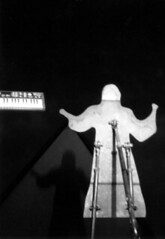I promised to give you a critique of some of Cardinal Ratzinger's work with the Congregation of the Doctrine of the Faith, some of the stuff that earned him his "God's rottweiler" image. Let's start with
Dominus Iesus, a document meant to reassert the primacy of the Christian faith and to explain the purpose of interfaith dialogue. I think one post is too little to unpick this document without drowning you in words, so I'm going to take the paragraph describing the problems in faith and in the world Dominus Iesus was meant to address, and throw out comments.
"It is held that certain truths have been superseded . . . The roots of these problems are to be found in certain presuppositions of both a philosophical and theological nature, which hinder the understanding and acceptance of the revealed truth. Some of these can be mentioned:
- the conviction of the elusiveness and inexpressibility of divine truth, even by Christian revelation;"
I think this is largely a semantic worry, but it's good for the CDF to hold folks accountable here. There are plenty of people who go around saying "We can never truly know (or rightly express) God's will", but the way they act tends to indicate that they think they know God's will pretty well. Lots of folks who share my views, and I, fall into this group. Anyone who works toward a relationship with God is fairly sure to develop an opinion about God's will sooner or later: if we truly believed God's will were unknowable, why bother? At the same time, accountability needs to be enforced on the other side: those who think that God's will is, in fact, perfectly knowable and expressible, and isn't it wonderful how it correlates with their own belief and words?
" - relativistic attitudes toward truth itself, according to which what is true for some would not be true for others;"
I'm with the authors here. Why is it not threatening to believe that your spouse, for example, or way of relating to your family and friends, or your political views, are the closest to ideal of anything you know, but when you state the same for your faith it's called intolerance? If I didn't believe Catholicism was the best faith I know, representing the closest thing to the truth about God and about how to live life, I could save myself some theological cognitive dissonance and even some sleep on Sunday mornings. I think often you'd be insulting people of another faith, anyway, by presuming to state that your beliefs were equally true, because they might believe their own to be better. If we all believed that everyone's faith had an equal amount of truth or potential for truth in it, we could all degenerate into one giant theological mishmash, and then we'd have no source for contrast, none of the self-inquiry that interfaith dialogue can generate, tons of self-satisfaction and no desire to learn more about our own traditions. Clearly, very few people profess and probably fewer actually do feel that way, and it's good that that's the case.
"- the radical opposition posited between the logical mentality of the West and the symbolic mentality of the East;"
Unless you're a college student, in which case the stereotype is East=math and West=humanities. Yes, we should celebrate and learn about both the rational and the symbolic elements of our own faiths; I still don't think this concern is causing the Church any major grief.
" - the subjectivism which, by regarding reason as the only source of knowledge, becomes incapable of raising its “gaze to the heights, not daring to rise to the truth of being”;"
Slippery slope here, CDF. The Magisterium itself refers to reason often, and with good, um, reason. For convincing people you have a choice between teaching their reason and touching their hearts. Both unruly organs can lead people to believe foolish things you don't want them to (as I read the Bible, there's no obstacle to women priests; I love my mom, and she'd make a great priest.) So you tell people they can't rely only on reason and you tell them their sensibilities have been clouded by the relativistic world they live in; you leave them only the printed documents of the Magisterium to turn to; and you'd gradually choke off every spark of genuine curiosity and trust and faith in the people of God; except that, unruly, fallible sheep as they are, and with the brilliant Spirit teasing at their minds and warming their hearts, they will not obey you.
"- the difficulty in understanding and accepting the presence of definitive and eschatological events in history;
- the metaphysical emptying of the historical incarnation of the Eternal Logos, reduced to a mere appearing of God in history;
- the eclecticism of those who, in theological research, uncritically absorb ideas from a variety of philosophical and theological contexts without regard for consistency, systematic connection, or compatibility with Christian truth;"
I grouped these three together as describing Christians who don't fully buy some basic Christian beliefs, with a personal jab at theologians. Jesus' life, God-ness and death were unique and special in history; the Christian faith, because of its special relationship to Jesus, is unique in important ways; I and many others would regard these statements as fairly basic categorizations of Christian beliefs. But there are lots of people who value their Christianity and don't agree. What then?
Maybe these people are being asked to subscribe to beliefs which aren't being logically explained to them. Faith is a combination of reason and heart, but they go hand in hand. People might have an easier time putting their heart behind something they intellectually understand, just as knowing something is true in your heart can help you dispense with the need for complete head-understanding.
Or maybe folks do understand the arguments for Jesus' unique divinity and just aren't convinced. Their heads and hearts, for whatever reason, aren't there yet. What, should we eradicate them from our communities until they magically believe? To me, a person who acts faithfully despite disbelief is a better Christian than one who believes: that is faith as an act of will, rather than as a sort of innate tendency, and a praiseworthy homage to God.
Or if doubts about these fundamental theological precepts lead people to turn away from the Church? That's a problem, but that can happen for so many reasons: doubts about the goodness of the Church organization, anger at God after painful things happen, disagreement with Church positions that are relatively speaking much more minor than those about the nature of Jesus and the Church. The answer to any such doubts is not to reiterate, reiterate, reiterate the current position, but to look for ways to make the truth more relevant, more refined, more in line with God's will (since we believe it's possible to know it), more true.
- "finally, the tendency to read and to interpret Sacred Scripture outside the Tradition and Magisterium of the Church."
Again: insisting that theological inquiry take place only with what's already been known about God is asking it to dwindle inward, becoming ever more picayune, less revolutionary (as God is), and less important to people's lives. What, is all God has revealed in the Scriptures already known to us? It's May 2, 2005, 11 p.m. Alert the media!
More later on this controversial and important document.
Warm blessings to you!



